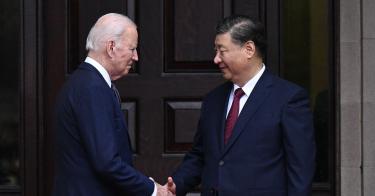風蕭蕭_Frank
以文會友中國拉攏非洲,美國卻在說教
2024年9月23日 戴安娜·弗希特戈特-羅斯 Diana Furchtgott-Roth 能源、氣候與環境中心主任,也是赫伯特和喬伊斯·摩根研究員。
https://www.heritage.org/china/commentary/china-woos-africa-while-america-lectures
拜登總統於2023年11月15日與中國國家主席習近平會麵。
關鍵要點
中國明智地向非洲——世界上人口增長最快的大陸——示好。
中國通過傾聽非洲國家的需求,而不是對他們指手畫腳,成功地與非洲國家進行了接觸。
為了重新獲得這種影響力,美國必須關注非洲的需求,例如改善廉價能源、商業和安全。
如果對本月出席在北京舉行的第九屆中非合作論壇峰會的50位非洲領導人進行民意調查,問他們對美國和中國哪個國家更看好,他們肯定會選擇後者。
誰又能責怪他們呢?習近平主席向他們提供了510億美元的貸款和100萬個就業崗位,同時大力推廣長城汽車的汽油動力皮卡、小型貨車和SUV。相比之下,美國卻要求他們遵守美國在氣候變化、性別平等和其他國內政治方麵的目標。
中國明智地向非洲——世界上人口增長最快的大陸——示好。誠然,非洲貧困程度最高,能源供應最匱乏,基礎設施最不發達,工業化水平也最低。然而,它也擁有豐富的自然資源來推動其增長,以及發達經濟體所需的具有戰略意義的礦產資源。
正如第九屆中非合作論壇所顯示的那樣,中國在與非洲的接觸和貿易方麵領先於美國。中國的發展議程側重於提供投資、基礎設施建設和貿易,以換取非洲礦產、土地、糧食生產以及港口、公路和鐵路等戰略資產的權利。
美國指令造成的危害的一個例子是南非科馬蒂燃煤電廠將於2022年關閉,該電廠由世界銀行提供的4.97億美元貸款資助。可再生能源本應彌補電力和就業崗位的損失,但至今尚未建成。電廠關閉導致工人失業,由於電力短缺,科馬蒂電廠所在地姆普馬蘭加省城鎮的商業活動急劇減少。
西方國家向南非公平能源轉型夥伴關係投資計劃提供的80億美元(其中包括拜登-哈裏斯政府提供的10多億美元)撥款,旨在用可再生能源取代燃煤發電,但該計劃最終失敗了。
南非總統委員會得出結論,科馬蒂燃煤電廠的關閉處理不當。壟斷南非電力供應的南非國家電力公司(Eskom Group)首席執行官丹·馬羅坎(Dan Marokane)表示:“現在對此已經毫無疑問。我們所有人都一致認為,不應重蹈科馬蒂的覆轍。” 該電廠不發電,科馬蒂的原工人也失去了工作。
2023年,南非總統西裏爾·拉馬福薩(Cyril Ramaphosa)根據總統氣候委員會的報告,就該國日益嚴重的電力短缺發出警告。Eskom造成了南非有史以來最嚴重的輪流停電,導致居民區停電、製造業中斷、企業受損。
但西方國家仍在不斷向他們推銷清潔能源。本周,歐盟承諾向南非提供兩筆總額為3500萬美元的撥款,用於發展綠色氫能項目。這項技術成本高昂,生產過程中消耗的能量是發電量的兩倍。
中國通過傾聽非洲國家的需求,而不是指手畫腳,成功地與非洲國家進行了接觸。這使得中國能夠從馬裏、津巴布韋和剛果民主共和國等國購買關鍵礦產。
通過在非洲和其他地區的業務,中國控製著全球38%的稀土元素、60%的稀土礦開采、85%的稀土加工、90%的稀土永磁體製造以及80%的鈷精煉產能。這使得中國在生產太陽能組件和電池方麵擁有比較優勢。
非洲領導人對通用汽車公司(GMW)生產的高級汽油動力汽車以及中國承諾的數十億美元的化石燃料發電投資表示讚賞。難怪中國在非洲的影響力增強,而美國卻喪失了影響力。
為了重新獲得這種影響力,美國必須關注非洲的需求,例如改善廉價能源、商業和安全。這將使非洲能夠發展高效的現代經濟,創造一個犯罪和恐怖主義得到控製的安全環境,以及保護個人和財產權利的法治。這不僅對非洲有利,也對美國的國家安全有利。
本文最初發表於《國家安全法》
China Woos Africa While America Lectures
Diana is Director of the Center for Energy, Climate and Environment and the Herbert and Joyce Morgan Fellow.

President Biden greets Chinese President Xi Jinping on November 15, 2023.BRENDAN SMIALOWSKI / Contributor / Getty Images
KEY TAKEAWAYS
China is wise to court Africa, the continent with the fastest growing human population in the world.
China is succeeding in engaging African countries by listening to what they want, rather than telling them what they should be doing.
To regain this influence America must focus on the needs of Africa, such as improving affordable energy, business and security.
If you were to poll the 50 African leaders who attended this month’s Ninth Forum on Africa-China Cooperation Summit in Beijing which nation they view more favorably, the United States or China, they’d surely pick the latter.
And who could blame them? President Xi Jinping offered them $51 billion in loans and a million jobs while promoting gasoline-powered pickup trucks, minivans, and SUVs by Great Wall Motors. The U.S., by contrast, is requiring them to adhere to American goals for climate change, gender equality and other aspects of American domestic politics.
China is wise to court Africa, the continent with the fastest growing human population in the world. Yes, Africa has the most poverty, the lowest access to energy, the least developed infrastructure and among the lowest levels of industrialization. Yet it also contains vast natural resources to power its growth, and strategically vital minerals needed by advanced economies.
As the Ninth Forum showed, China is ahead of America in engaging and trading with Africa. China’s developmental agenda focuses on providing investment, infrastructure development and trade in return for rights to African minerals, land, food production and strategic assets such as ports, roads and railroads.
An example of the harm that American directives are causing is the 2022 Komati coal-fired power plant closure in South Africa, funded by a $497 million loan from the World Bank. Renewable energy was supposed to replace both lost power and lost jobs, but it hasn’t been built. The plant’s closure has left workers unemployed and, with electricity scarce, commercial activity has dramatically declined in towns in the Mpumalanga Region, where the Komati plant is located.
Western grants of $8 billion (including over $1 billion from the Biden-Harris administration) to the South Africa Just Energy Transition Partnership Investment Plan, which aims to replace coal-fired power with renewables, have been a failure.
A presidential commission in South Africa concluded that the closure of the Komati coal fired plant was mishandled. CEO Dan Marokane of the Eskom Group, which has a monopoly on the provision of electricity in South Africa, said, “There is now no confusion about this. All of us are now aligned that we should not repeat Komati.” The plant produces no power, and the former Komati workers don’t have jobs.
In 2023 South Africa President Cyril Ramaphosa, following a report by the Presidential Climate Commission, issued a warning over the country’s increasing amount of power shortages. Eskom produced the nation’s worst rolling blackouts on record, shutting down residential areas, disrupting manufacturing, and harming businesses.
But the West keeps pushing clean energy on them. This week the European Union pledged to give South Africa two grants worth $35 million to produce green hydrogen projects, a costly technology that uses twice as much energy to make as it produces in electricity.
China is succeeding in engaging African countries by listening to what they want, rather than telling them what they should be doing. This enables China to buy critical minerals from countries including Mali, Zimbabwe, and Democratic Republic of the Congo.
Through operations in Africa and elsewhere China controls 38% of global rare earth elements and 60% of rare earth mining, 85% of rare earth processing, and 90% of rare earth permanent magnet manufacturing, as well as 80% of cobalt refining capacity. This enables China to have a comparative advantage in producing solar components and batteries.
African leaders appreciate the executive gasoline powered vehicles from GMW and the billions for fossil fuel power promised by the Chinese. No wonder that China has gained influence and America has lost influence in Africa.
To regain this influence America must focus on the needs of Africa, such as improving affordable energy, business and security. This will allow Africa to develop productive modern economies, a secure environment where crime and terrorism is under control, and the rule of law to protect individual and property rights. Not only will this be best for Africa, but also for the national security of the United States.
This piece originally appeared in National Security Journal





